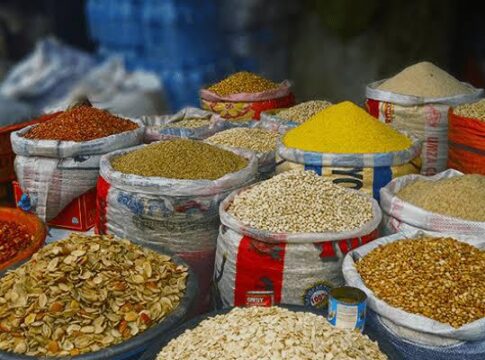For the first time in months, food prices in Abuja and its surrounding areas are falling, bringing temporary relief to struggling households.
A market survey by the News Agency of Nigeria (NAN) shows significant price reductions for staples like rice, onions, and beans, although some items—such as yam and pepper—are still rising.
At Kado Market, a 50kg bag of rice, which sold for N97,000–N100,000 in January, now costs N87,000. In Nyanya Market, prices have dropped even further, with the same bag now selling for as low as N70,000. Meanwhile, in Garki Market, onion prices have plummeted from N180,000–N200,000 per bag in January to N55,000–N60,000.
The decline in food prices comes as a relief to many Nigerians, who have been battling inflation and rising living costs. However, some experts warn that this trend may be temporary unless the government addresses key issues such as transportation costs and insecurity affecting farmers.
Why Are Prices Dropping?
Traders point to multiple factors behind the price decline. Mr. Albert Okoro, a rice wholesaler in Garki Market, credits a slight reduction in fuel prices, which has lowered transportation costs. “It used to be a struggle to get goods from the North due to high fuel prices, but things have eased a little,” he explains.
READ MORE: Four Men to One Woman: NELFUND Highlights Gender Disparity in Education Loans
Another factor is seasonal supply. “Onions and beans are harvested in large quantities around this time,” says Musa Danladi, a trader at the Orange Market. “That’s why prices have come down. But once the season ends, we could see prices rise again.”
Government interventions may also be playing a role. Recent efforts to support local farmers and improve food distribution have helped stabilize the market, though many believe more needs to be done.
But Not All Prices Are Falling
While rice, onions, and beans have become more affordable, yam, plantain, and pepper tell a different story. At Wuse Market, five medium-sized tubers of yam, previously N8,000–N10,000, now cost N15,000. Similarly, a big bag of pepper has surged from N31,000 to N73,000, nearly doubling in price.
This mixed trend raises concerns about long-term food security. “We need policies that ensure stable food prices,” Amina Suleiman, a mother of four said in an interview with a local newspaper. “This drop is good, but it’s not enough. The government must help farmers with better infrastructure and security so food remains affordable.”
For now, Abuja residents are cautiously optimistic, enjoying the momentary relief while keeping a close eye on what comes next.




